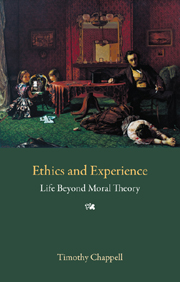Book contents
- Frontmatter
- Contents
- Acknowledgements
- 1 The turn to reason: how human beings got ethical
- 2 Demarcation: what does “ethical” mean?
- 3 Motivation: why be moral?
- 4 Deliberation: the question of reason
- 5 Introducing subjectivism and objectivism
- 6 Five arguments for ethical subjectivism
- 7 The content of ethics: expressivism, error theory, objectivism again
- 8 Virtue ethics
- 9 Utilitarianism
- 10 Kantianism and contractarianism
- 11 Theory and insight in ethics
- Further reading
- Bibliography
- Index
3 - Motivation: why be moral?
- Frontmatter
- Contents
- Acknowledgements
- 1 The turn to reason: how human beings got ethical
- 2 Demarcation: what does “ethical” mean?
- 3 Motivation: why be moral?
- 4 Deliberation: the question of reason
- 5 Introducing subjectivism and objectivism
- 6 Five arguments for ethical subjectivism
- 7 The content of ethics: expressivism, error theory, objectivism again
- 8 Virtue ethics
- 9 Utilitarianism
- 10 Kantianism and contractarianism
- 11 Theory and insight in ethics
- Further reading
- Bibliography
- Index
Summary
“The challenge”, said Glaucon, “is that even those whose way of life is just, only live that way against their will – because they are not strong enough to be unjust …
“Justice is plainly not a good to any individual; for whenever someone thinks they are going to be in a position to act unjustly, they do act unjustly. Every man holds that, as far as his individual interest goes, injustice is far more profitable than justice … For anyone who came by this sort of power [to act unjustly and get away with it], and then proved unwilling to act unjustly or get their hands on other people's goods, would be considered most pitifully stupid by those who perceived his behaviour. Nonetheless they would praise him in front of one another: each person's fear that someone might treat him unjustly would cause him to hide what he really thinks of the just man.”
(Plato, Republic 359b5–360d9, my translation, following Chappell 1996: 121–3)Thou shalt not get found out.
(The Eleventh Commandment [traditional])Demandingness in different moral theories
In Chapter 1, I defined ethics as the use of reason to answer the question “How should life be lived?”. Presumably the most basic answer is “Life should be lived well”. But this is not the interesting bit. The interesting – and difficult – bit is saying what counts as living well.
- Type
- Chapter
- Information
- Ethics and ExperienceLife Beyond Moral Theory, pp. 11 - 19Publisher: Acumen PublishingPrint publication year: 2009



